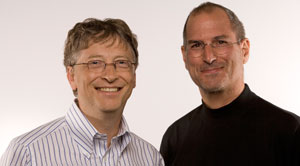Truth-squading Microsoft's Nokia mobile investment: It's nothing like the Apple deal of 1997


Here's what I saw passed around the social networks this past weekend, unattributed. (I've added links to source documents in case you've forgotten some of the deals.)
Buying technology, distribution & market reach (Microsoft invested in Facebook 2007, offered generously for Yahoo, invested in Apple in 1997 & $1b in Comcast same year - to gain IP, partnerships & rapid market access - once market parameters are established). Smart business plays.
My head is reeling from the spin. Perhaps Microsoft's failed 2008 hostile takeover bid for Yahoo can be seen as a similar play to the Nokia technology deal, but the Facebook investment and Comcast deal? No way.
Worse, there is no truth to the claim that the money paid to Apple was a similar "investment" and a simple "smart business play."
As I've written before, Microsoft didn't "save" nor truly "invest" in Apple with its payment of $150 million during the summer of 1997. The truth is more complicated and nuanced. Here's the story:
This announcement was made by Steve Jobs at the keynote address for the 1997 Boston Macworld Expo. I sat in the hall that morning. Then Microsoft CEO and Chairman Bill Gates appeared from above on a projection said that Microsoft had bought $150 million in Apple stock and that Microsoft would continue to develop Office for Mac for at least 5 more years, starting with the release of Mac Office 98.
"We’re also excited about Internet Explorer. And we’ve got a very dedicated team that’s down in California that works on that product. The code is really specially developed for the Macintosh. It’s not just a port of what we’ve done in the Windows environment," he said.
"And so we’re pleased to be supporting Apple. We think Apple makes a huge contribution to the computer industry. We think it’s going to be a lot of fun helping out, and we look forward to the feedback from all of you as we move forward doing more Macintosh software. Thanks."
No, thank you, Pappa Bill. What a nice thing for those kind folks up in Washington to do for us poor Mac users, right? It's an "investment" in the Macintosh, "helping out" that fun little platform — even if you would be better off using a real operating system like Windows 95.
Unsaid, the truth was that Microsoft wasn't investing. Rather, it was making a payoff for stealing Apple video code, making sure that its Internet Explorer would be the industry standard browser, and ensuring that Windows had some antitrust cover.
Check Out: Stop the lies! The day that Microsoft 'saved' Apple
The investment lie. Microsoft’s $150M stock "investment" came as the result of a settlement of a lawsuit. In fact, the said investment was just an initial payment for other “substantial balancing payments” that would be spread out over then next few years, then Apple CFO Fred Anderson said at the time.
The payments totaled more than $500 million, according to reports.
Antitrust cover. Of course, Microsoft was also worried about the collapse of the Mac market, not so much for actual business reasons – despite the millions of Mac Office customers that Gates mentioned in his speech — but instead for antitrust cover. After spending years attacking the Mac platform and killing Cupertino's forays into the business, government and higher education markets, Microsoft management realized that there might be a difference between being an actual monopoly rather than just kicking its competition with monopolistic practices. Even if the Macintosh held less than 5 percent share of the desktop market, the Mac was still the only alternative at the time to the Wintel platform.
The browser wars. Younger readers may not remember that the Internet was just becoming The Internet in the 1990s. Netscape Navigator was still the primary browser in the mid-1990s and was responsible for common technologies such cookies and JavaScript. It was only with the release of IE 4.0 that Microsoft took significant market share from Netscape.
Jobs announced at the Expo hall that Apple would make Internet Explorer its default browser. Here's a bit of what he said after Gates' presentation"
"Another bolt of lightning is that Apple plus Microsoft equals 100 percent of the desktop computer market. And so, whatever Apple and Microsoft agree to do — it’s a standard," Jobs said.
"I think that you’ll see us work with Microsoft more because they’re the only other player in the Desktop Industry; and I think that you’ll want to see Microsoft work with Apple more, because Apple is the only other player in the Desktop Industry. So I hope we have even more cooperation in the future because the industry wants it."
The outcome: Apple survived, Microsoft was found guilty of antitrust violations for its browser practices, and for years Microsoft print servers supported the Classic Mac OS better than Apple did. Go figure.